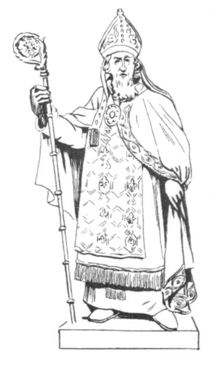Samuel Harsnett
|
The Most Reverend and Right Honourable Samuel Harsnett |
|
|---|---|
| Archbishop of York | |
 |
|
| Province | Province of York |
| Diocese | Diocese of York |
| Installed | 1629 |
| Term ended | 1631 |
| Predecessor | George Montaigne |
| Successor | Richard Neile |
| Other posts |
Bishop of Chichester (1609–1619) Bishop of Norwich (1619–1628) |
| Orders | |
| Ordination | 1583 |
| Personal details | |
| Birth name | Samuel Halsnoth |
| Born | June 1561 Colchester, Essex |
| Died | 25 May 1631 Moreton-in-Marsh, Gloucestershire |
| Buried | St Mary's Church, Chigwell |
| Nationality | British |
| Denomination | Anglicanism |
| Parents | William & Agnes Halsnoth |
| Spouse | Thomasine Harsnett |
| Children | Thomasine Harsnett |
| Alma mater | Pembroke College, Cambridge |
Samuel Harsnett (or Harsnet) (June 1561 – May 1631), born Samuel Halsnoth, was an English writer on religion and Archbishop of York from 1629.
Born in St Botolph's parish, Colchester, Essex, the son of William Halsnoth, a baker, and his wife Agnes, Harsnett was probably educated at Colchester's free school, now Colchester Royal Grammar School. After leaving school, he was inducted into King's College, Cambridge on 8 September 1576 and removed into Pembroke College, Cambridge where he gained a BA in 1580/1 and was elected a Fellow on 27 November 1583. In 1583 he was ordained into the Church of England, where he was soon disciplined by Archbishop Whitgift for preaching against predestination at St Paul's Cross on 27 October 1584. As Hughson notes, "he was one of those divines who opposed the decrees of the synod of Dort and he wrote a very learned treatise against absolute predestination". In 1584 he proceeded Master of Arts by seniority.
In March 1587 Harsnett became headmaster of Colchester Royal Grammar School. In recognition of his achievements, the school has had, since 1908, a school house bearing his name. Preferring his studies at Cambridge University to the position, he resigned his office in November 1588, disliking the "painful trade of teaching", and returned to Pembroke Hall where he studied divinity, gaining his BD c.1590.
He re-entered himself into Pembroke Hall, where he was first a fellow and was elected master on 1 November 1605, remaining in that position until 1616, when he resigned because accusations totalling fifty-seven articles were made against him, by the Fellows of Pembroke to King James I. He was also Vice-Chancellor of Cambridge University for the years 1606, the same year he gained his Doctor of Divinity degree, and 1609.
...
Wikipedia
